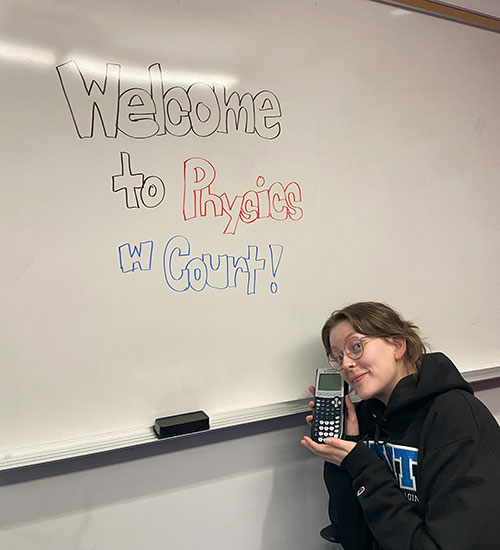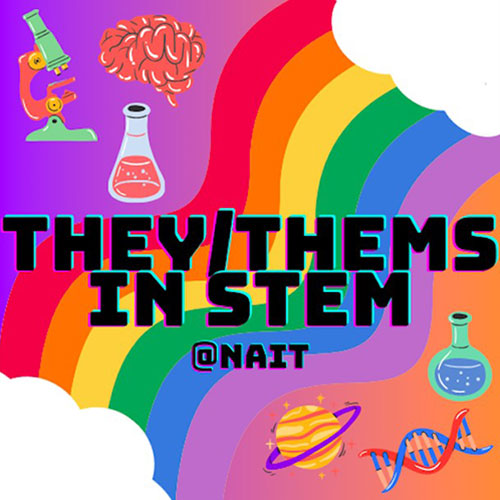A declaration of identity and a claiming of space
Court Slaughter was nervous about coming to Edmonton to study to be a magnetic resonance imaging (MRI) technologist. For one thing, born and raised in southern Alberta, they were moving across the province to an unfamiliar city. But they were also uncertain about fitting in.
Owing mostly to what they saw on social media, Slaughter understood health care to be dominated by cisgender, straight women.
“I was feeling scared,” says Slaughter, a 24-year-old who identifies as non-binary, their gender falling outside of male and female. “I was like, ‘How will people perceive me?’”
Ultimately, they would discover that that perception was in some ways up to themself. With the help of an instructor, Slaughter took measures that amounted to a declaration of identity and a claiming of space. And since November 2023, they’ve shared that space with others by creating They/Thems in STEM.
It’s a first-of-its-kind club at NAIT that seeks to highlight pride in diversity among those who feel most at home when just given the opportunity to nerd out about science and tech with friends. But it also highlights the fact that STEM – including education and careers in science, technology, engineering and math – remains an exclusive club in its own right.
Progressive pronouns
 They/Thems in Stem has roots in the orientation for Slaughter’s MRI class. During introductions, they were the lone student to share pronouns. At the time, Slaughter requested she/they, partly because they felt it would be easier for colleagues and partly to “soften the blow” of inevitably being misgendered.
They/Thems in Stem has roots in the orientation for Slaughter’s MRI class. During introductions, they were the lone student to share pronouns. At the time, Slaughter requested she/they, partly because they felt it would be easier for colleagues and partly to “soften the blow” of inevitably being misgendered.
Among instructors, chair Brianne Forest (MRI ’14) stood out for sharing her (she/her).
That stuck with Slaughter, and they remarked on it in feedback Forest later requested from students about the start of the course.
“I would love to have a conversation with you,” they told Forest, who set up a meeting.
Their talk ranged widely. Forest assured Slaughter that health care, where the program chair still works on a casual basis, is a field supported by a diverse group of professionals, not all of them sporting stylish Figs scrubs and toting trendy Stanley Cups, à la TIk Tok.
As for pronouns, Slaughter shared that they were disappointed that most people, given the option, still chose to use “she.”
“We just kind of talked it out and I said, ‘You know, people are usually coming from a good place. They're not trying to be malicious,’” says Forest.
"People are usually coming from a good place. They're not trying to be malicious.”
The conversation ended as an exploration of belonging and what a person needs to feel that they do. Slaughter realized that they needed to help themself and others by being clear about who they were and to acknowledge that; with that, they changed their pronouns to they/them.
And they also realized they needed community. When Slaughter raised the idea of a club, Forest pointed out that you only needed three people to start one at NAIT. “It can make you feel a lot less alone,” she told them.
Thanks in part to Forest, change was set in motion. “She was very much a nudge for me that I definitely needed at the time,” says Slaughter.
An ongoing need for diversity
 So far, They/Thems in Stem has been well received. This March, during NAIT’s Pride Week, the club hosted a safe spaces event on campus. And the group has been growing beyond the circle of friends who helped Slaughter start it.
So far, They/Thems in Stem has been well received. This March, during NAIT’s Pride Week, the club hosted a safe spaces event on campus. And the group has been growing beyond the circle of friends who helped Slaughter start it.
Forest sees the club as a much-needed counter to the potentially confusing confluence of social media and small classes that don’t always reflect the composition of health-care staffs in industry.
“I feel like [it’s] raising awareness that there are spaces for everybody in STEM, in health care and in all of these various fields,” says Forest.
The need for that awareness persists.
Men, for example, are not only the most represented group in STEM education but also most likely to persist in their studies to graduation.
It’s a serious issue, but Slaughter doesn’t intend for the club to be any more serious than its acknowledgement that inclusion matters. Programming at They/Thems in STEM is comfortably loose. Trivia nights are a top priority. Informal chats about new developments in science and tech aren’t far behind. Plans are afoot for a group trip to the Telus World of Science.
“It's very much open to whatever people want to do,” says Slaughter.
Mostly, the club is a place for people to celebrate who they are and to know that their identity need not be a barrier to pursuing their interests and aspirations.
“I’m just a nerd and queer,” Slaughter says. “Feel free to use that quote.”
Banner image by monkeybusinessimages/istockphoto.com